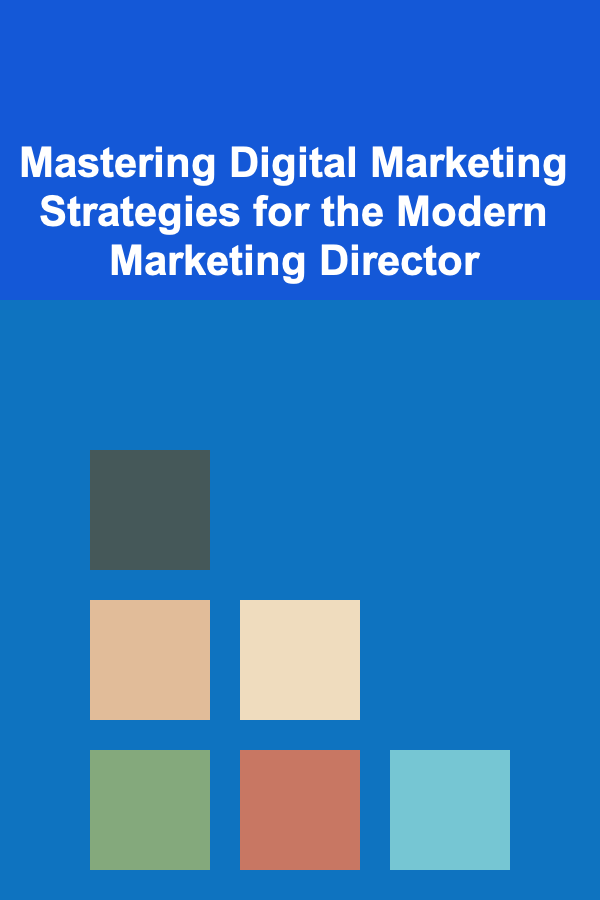
Mastering Digital Marketing Strategies for the Modern Marketing Director
ebook include PDF & Audio bundle (Micro Guide)
$12.99$9.99
Limited Time Offer! Order within the next:

In today's fast-paced business world, digital marketing is no longer a secondary or "optional" strategy. It is an essential component for businesses aiming to thrive in an increasingly competitive environment. For modern marketing directors, mastering digital marketing strategies isn't just about understanding the tools available but knowing how to integrate them into a cohesive, data-driven approach that delivers real, measurable results.
This actionable guide is designed to provide marketing directors with an in-depth understanding of digital marketing strategies, offering practical insights, examples, and techniques to help them succeed in the digital age.
Understanding the Digital Marketing Landscape
The Changing Consumer Behavior
The way consumers engage with brands has drastically changed in recent years. Traditional forms of advertising, such as TV and print, are increasingly being replaced by online channels. Consumers are now more connected than ever, using smartphones, tablets, and laptops to access information and make purchasing decisions. This shift has led to a new era of personalized and data-driven marketing strategies.
The modern marketing director must not only understand how digital platforms operate but also how consumer behavior shifts across these channels. People now interact with content differently than they did in the past; they want to engage with brands in meaningful ways, and they expect seamless experiences across devices.
The Role of Data and Analytics
Data has become the cornerstone of modern marketing. Marketing directors need to leverage big data to analyze consumer behavior, segment audiences, and tailor campaigns that resonate with specific groups. Understanding key metrics such as click-through rates (CTR), return on investment (ROI), customer lifetime value (CLV), and conversion rates is critical for crafting successful campaigns.
Data-driven decision-making allows marketers to pivot strategies quickly based on real-time insights. A modern marketing director must be comfortable with the tools that analyze and interpret this data, from Google Analytics and CRM platforms to social listening tools and AI-powered insights.
Key Digital Marketing Strategies
Search Engine Optimization (SEO)
SEO is the foundation of any digital marketing strategy. It ensures that your website is discoverable by users who are searching for products, services, or information related to your business. An effective SEO strategy drives organic traffic, builds brand credibility, and improves conversion rates.
Actionable Tips for SEO Success:
- Keyword Research: Use tools like SEMrush, Ahrefs, or Google Keyword Planner to identify high-volume, low-competition keywords related to your business. This allows you to create content that is highly targeted and relevant.
- On-Page Optimization: Focus on optimizing title tags, meta descriptions, headers, and URL structure. Ensure your content is well-written, easy to read, and includes the targeted keywords naturally.
- Technical SEO: Improve site speed, mobile-friendliness, and site architecture. Google rewards websites that provide a great user experience, so these elements are crucial for ranking well.
- Backlink Strategy: Build quality backlinks from reputable sites in your industry to improve domain authority and drive referral traffic.
Content Marketing
Content marketing involves creating valuable, relevant content that attracts, engages, and retains your target audience. It can take many forms: blogs, infographics, videos, podcasts, eBooks, case studies, and more.
Actionable Tips for Content Marketing Success:
- Content Calendar: Develop a content calendar to ensure a consistent publishing schedule. This helps in planning and executing campaigns around important business milestones, holidays, or events.
- Quality over Quantity: It's more effective to produce fewer, high-quality pieces of content than to churn out a large volume of mediocre material. Invest in content that educates, informs, and adds value to your audience.
- Repurposing Content: Don't let great content go to waste. Repurpose successful blog posts into infographics, videos, or even podcasts to maximize their reach and value.
Social Media Marketing
Social media platforms such as Facebook, Instagram, LinkedIn, and Twitter provide marketing directors with the opportunity to connect directly with their target audience. Social media marketing is vital for building brand awareness, nurturing customer relationships, and promoting products.
Actionable Tips for Social Media Marketing Success:
- Platform Selection: Not every platform is right for every business. Identify where your target audience spends their time, and focus your efforts on those platforms. For B2B, LinkedIn might be the best option; for B2C, Instagram and Facebook might yield better results.
- Engagement and Community Building: Social media isn't just about posting content---it's about fostering a community. Engage with your followers by responding to comments, sharing user-generated content, and conducting polls or surveys.
- Paid Social Advertising: Use paid social media ads to increase brand visibility and drive conversions. Tools like Facebook Ads Manager offer sophisticated targeting capabilities, allowing you to reach your ideal audience based on demographics, behavior, and interests.
Email Marketing
Email marketing remains one of the most powerful tools in a marketer's arsenal. It allows you to communicate directly with your customers and leads, offering personalized content that drives engagement and conversions.
Actionable Tips for Email Marketing Success:
- Segmentation: Divide your email list into segments based on factors like demographics, purchase history, and engagement level. This allows you to send tailored content that is highly relevant to each group.
- A/B Testing: Test different subject lines, calls to action (CTAs), and design elements to determine what resonates best with your audience.
- Automated Campaigns: Implement email automation for tasks like welcome emails, abandoned cart reminders, and post-purchase follow-ups. These can significantly improve customer retention and increase sales.
Pay-Per-Click (PPC) Advertising
PPC is an essential component of a comprehensive digital marketing strategy. Paid search ads (e.g., Google Ads) and display ads enable businesses to reach their target audience at the moment they are searching for products or services.
Actionable Tips for PPC Success:
- Keyword Targeting: Similar to SEO, keyword research is key in PPC. Focus on high-intent keywords that drive the most qualified traffic.
- Ad Copy Optimization: Write compelling, action-oriented ad copy that includes your targeted keywords and addresses your audience's pain points.
- Landing Page Optimization: Ensure that your landing pages align with your ads and provide a seamless, persuasive experience for users. A slow or disjointed landing page can lead to a high bounce rate and wasted ad spend.
Influencer Marketing
Influencer marketing has grown in popularity, particularly on platforms like Instagram, TikTok, and YouTube. By partnering with influencers who already have a strong following, brands can access new audiences and leverage the trust these influencers have built with their followers.
Actionable Tips for Influencer Marketing Success:
- Choose the Right Influencers: The most important factor in an influencer partnership is authenticity. Choose influencers whose values align with your brand and whose followers reflect your target audience.
- Define Clear Goals: Establish clear objectives for the campaign, whether it's increasing brand awareness, driving traffic to your site, or generating sales.
- Track Results: Use tracking links and unique discount codes to measure the effectiveness of your influencer campaigns. This will help refine future influencer marketing efforts.
Integrating Digital Marketing for Maximum Impact
Creating a Unified Strategy
Digital marketing is not about individual tactics working in isolation; it's about creating an integrated approach where each element complements and enhances the others. For a modern marketing director, the key is to develop a unified strategy that ties together SEO, content marketing, social media, email marketing, PPC, and other channels into one cohesive plan.
Actionable Tips for Strategy Integration:
- Cross-Channel Consistency: Ensure that your messaging is consistent across all channels. The tone, visual identity, and key messages should be aligned to reinforce your brand's voice.
- Unified Customer Journey: From the first touchpoint to conversion, the customer's experience should be seamless. Use customer relationship management (CRM) tools to track interactions across different channels and provide personalized experiences at every stage.
- Optimize for Conversions: All digital marketing efforts should be focused on driving conversions. Use clear CTAs, optimize landing pages, and continually analyze the performance of each campaign.
Measuring Success and Continuous Improvement
Key Performance Indicators (KPIs)
Measuring the success of your digital marketing strategy requires a deep understanding of KPIs. The right KPIs depend on your business goals and the specific tactics you are using. Common KPIs for digital marketing include:
- Website Traffic: Tracks the number of visitors to your site, helping you measure the reach of your campaigns.
- Conversion Rate: Measures how well your website or landing pages convert visitors into leads or customers.
- Customer Acquisition Cost (CAC): Indicates how much it costs to acquire a new customer, providing insight into the efficiency of your marketing efforts.
- Return on Investment (ROI): Calculates the financial return on marketing expenditures, helping you determine whether your strategies are profitable.
Actionable Tips for Success Measurement:
- Use Analytics Tools: Google Analytics, social media insights, and email marketing platforms offer powerful analytics tools that provide detailed data on user behavior and campaign performance.
- Set Clear Benchmarks: Establish baseline metrics before launching any campaigns, and compare results against these benchmarks to assess performance.
- Continuous Optimization: Digital marketing is dynamic. Regularly review your campaigns, identify areas for improvement, and optimize strategies based on performance data.
Conclusion
For the modern marketing director, mastering digital marketing strategies requires a combination of technical knowledge, creativity, and data-driven decision-making. With a clear understanding of digital tools and platforms, effective integration of strategies, and a commitment to measuring and optimizing performance, marketing directors can lead their organizations to success in the digital age.
By focusing on core tactics like SEO, content marketing, social media, email, PPC, and influencer marketing, and aligning them within an integrated strategy, you can create campaigns that not only meet but exceed your marketing goals. Through continuous learning, adaptation, and data analysis, your digital marketing efforts will evolve, keeping you ahead of the curve and your business at the forefront of the digital marketplace.

Beginner's Guide to Creating a Simple Website
Read More
How to Combine SMS with Email for a Multi-Channel Abandoned Cart Recovery Strategy in Dropshipping
Read More
How to Create a Relaxing Reading Nook in Your Hobby Room
Read More
How to Make Money by Automating Tasks with Deep Learning Models
Read More
How to Organize Your Home Library by Genre
Read More
How to Start Big Air Skiing and Snowboarding
Read MoreOther Products

Beginner's Guide to Creating a Simple Website
Read More
How to Combine SMS with Email for a Multi-Channel Abandoned Cart Recovery Strategy in Dropshipping
Read More
How to Create a Relaxing Reading Nook in Your Hobby Room
Read More
How to Make Money by Automating Tasks with Deep Learning Models
Read More
How to Organize Your Home Library by Genre
Read More